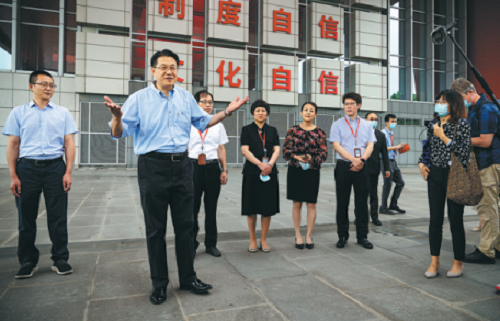Leaders for tomorrow
Some students at the academy introduce themselves to the press before interviews during a state media organized trip. [PHOTO BY YANG FEIYUE/CHINA DAILY]
The China Executive Leadership Academy Pudong is a national institution in leadership training and development. It was approved by the Central Committee of the CPC and State Council and opened in 2005.
The academy is equipped with modern facilities for teaching, administration and holding conferences. It boasts an expansive library, sports and student residences, accommodating more than 800 full-time students for training. Students include senior and mid-level Party and government officials, high-level business executives, senior professionals, diplomats and military officers. It also offers tailor-made programs trusted by government departments, enterprises and social organizations from both home and abroad.
Its top-down courses mainly tackle the practices of China's reform and opening-up policy, focusing on urbanization and urban modernization, the development of the Yangtze River Delta and modern financial management and innovation.
"Our Party and government administration training is actually evolving with the changes to domestic and international situations," says Mao Xinya, a professor at the teaching experiment and case development center of the academy.
The fact that the outside world is paying more attention to China means skills such as communication are all the more important for Party and government officials at all levels, Mao says.
"So we will also arrange more practical courses for foreign exchange and communication."
Mao has been teaching the intricacies of the pilot free trade zone and economic integration of the Yangtze River Delta at the academy since 2006.
"I feel the students are getting younger and their diplomas are increasingly high," she says.
Students will also come to Mao with issues from work and discuss them with her via WeChat after class. Mao says it has prompted her to strengthen real-case studies and find discipline in practice and theorize it.
"I think it's a very important mission for a teacher at this State-level academy to build a bridge between practice and theory," Mao says.
Normally, training lasts for 10 to 14 days, but communication between students and the faculty members continues afterwards.
Wang Shiquan has been teaching communications at the academy since its opening. He is director of the teaching experiment and case development center. His expertise covers publicity crisis management, external communication and leadership development.
"We encourage them (students) to learn from, and open up to, foreign reporters," Wang says.
 Contact Us
Contact Us


 Pudong lights up city with spectacular shows and cultural marvels
Pudong lights up city with spectacular shows and cultural marvels Brilliant light show to illuminate Huangpu River
Brilliant light show to illuminate Huangpu River Maple leaves paint splendid scenery in Pudong
Maple leaves paint splendid scenery in Pudong Appreciate alluring lotus blossoms in Pudong's Century Park
Appreciate alluring lotus blossoms in Pudong's Century Park


